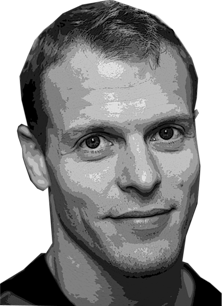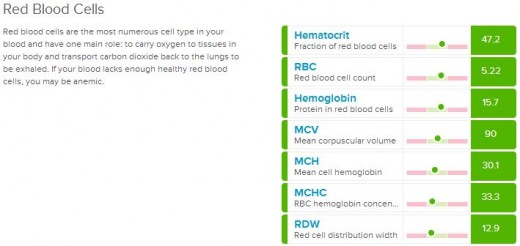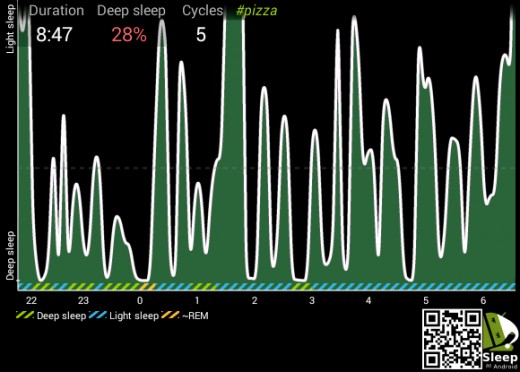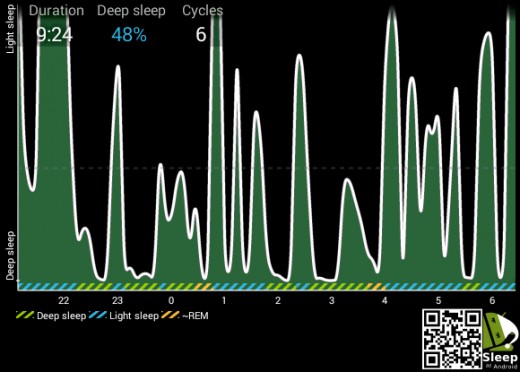Tracking and Hacking Health and the Importance of Data-Gathering
Gimmicky Buzzwords and Defining Terms
In the multi-billion dollar health industry with innumerable competing products and voices, the consumer can sometimes have difficulty understand what, “health” really means. In an effort to mitigate this ambiguity, I define this term as, “the state of maximum functional longevity, cognitive performance, fertility in fertile years, and minimum likelihood of disease or injury.” With this working definition, we can better understand what health is and how we can improve it.
Does Health Matter?
Some treat health like a hobby or interest relevant only to a select group of people. I hope that given the above definition, the reader will understand that health has relevance to all in pursuit of happiness. More specifically, a short life, poor cognitive function, infertility when fertility is desired, disease, and injury not only present obstacles to happiness but also represent some of the most pressing global issues. When we pursue health, we alleviate these global issues through reducing the need for the medical community to provide health care, we save resources through fat reduction leading to weight loss which in turn reduces the fossil fuels necessary to transport us, we save money on medicine and save the resources needed to produce that medicine, we increase the time and probability of contributing valuable wisdom and work within the workforce, and we make those around us happier when we ourselves are happy and healthy. Good health has innumerable positive global effects worth pursuing.
How We Improve Anything Is How We Improve Everything: Lessons from a Polyglot, Memory Champion, and Entrepreneur
Health improvement is at least as controversial as the definition of health itself. In light of this controversy, I will try to build a framework for understanding improvement from the “hacker” mindset. This is another one of those increasingly used and ill-defined terms that I define as, “a data-driven, multi-disciplinary approach to problem solving in any area of life for the purpose of customization and optimization.” Some fun examples of hackers should shed light on this mind-set and why I think it is so helpful.

Benny the Irish Polyglot is a language hacker who could only speak English until the age of 21. Today, he speaks 11 languages and counting. What changed? He decided to hack the language learning process after failing in his linguistic endeavors all throughout school and even when “immersing” himself in Spanish while abroad in Spain. This process began with his reevaluation of what he thought he knew about learning languages in light of a new approach with the singular goal of obtaining conversational fluency. Benny pursues this goal from many different disciplinary standpoints through advanced memory techniques to remember vocabulary, traditional linguistic techniques to obtain greater degrees of fluency, and countless other fields of study to attain his fluency goals.
Data drives Benny’s approach because he constantly tries to figure out what sort of language errors he’s making so that he can fix them. In fact, one of his primary life lessons learned through traveling the world for over a decade has been that we learn best through our mistakes. This idea acts as the foundation of Benny’s entire fluency methodology that he sums up with the phrase, “speak from day one.”
Although Benny has customized his language-learning approach to his own unique life-style and experiences and continues to fine-tune his methods for personal results, his blog, book, and other services provide valuable insight into language learning that people from all walks of life can use. Benny acts as a great example of how hackers tend to help others despite the personal nature of a hacker’s goals.

Grand-master of memory, co-founder of Memrise, and star of the best-seller, Moonwalking with Einstein, Ed Cooke, also pursues language learning but from the unique perspective of a memory hacker. More specifically, Ed has memorized 1000 random digits in under an hour, the order of 10 decks of cards in an hour, and the order of one deck of cards in under a minute, all the while crediting these sorts of memory tricks to creative problem-solving rather than innate skill. In light of this claim, I decided to pursue memorizing a deck of cards myself as detailed in Tim Ferriss’s Four Hour Chef. To my surprise, I was able to memorize a deck in just under eight minutes, confident I could continue shaving down my time with more practice. This surreal result of accomplishing what I had previously considered entirely impossible fostered in me the life-hacking mindset I have today.
Ed approaches memory from many different disciplines including ancient Roman techniques as well as high-tech review using spaced repetition algorithms. Data drives his approach as seen in his coaching of Josh Foer in Moonwalking with Einstein when he recommends Foer flip playing cards to the speed of a metronome set slightly faster than Foer’s speed of memorization, enabling him to overcome plateaus in his training. Ed has customized his approach to memorizing a deck of cards through the invention of highly detailed methods and continues to fine-tune his methodology to remember anything he wants for as long as he wants.

While the above hackers specialize in certain categories, Tim Ferriss is a true “life-hacker,” applying a multi-disciplinary, data-driven, problem-solving approach to many areas of life including high-speed language acquisition, learning to cook, outsourcing business operations, and even outsourcing his dating life. His best-selling books, The Four Hour Body, The Four Hour Work Week, and The Four Hour Chef chronicle his personal experiences in hacking health, wealth, and wisdom. From snorting smart drugs to becoming an excellent chef, Ferriss has dabbled in so many areas of expertise he raises the bar for the meaning of the term, “renaissance man.”
His life-hacking process certainly involves a multi-disciplinary approach evidenced by his multi-disciplinary life. Tim’s “meta-learning” technique detailed in The Four Hour Chef involves making data-driven decisions based on deconstructing a discipline’s constituent skills, selecting the most valuable of these constituent skills, and determining the proper sequence of learning these skills tailored to the custom goal of achieving world-class, or top five percent status, in any discipline of choice. In short, hackers like Benny Lewis, Ed Cooke, and Tim Ferriss reveal the power of the hacking mindset to obtain measurable success in any area of life.
A Marriage of Concepts
A marriage of these concepts of health and hacking yield the framework for health improvement through applying a multi-disciplinary, data-driven approach to maximize functional longevity, cognitive performance, fertility in fertile years, and to minimize the likelihood of disease or injury. With this framework, I believe the reader can obtain the sort of measurable success in health improvement that Lewis, Cooke, and Ferriss have experienced in other realms of life.
Data Collection Benefits and Lessons Learned from Too Much Ice Cream
Data-collection is step one in health improvement because it realigns perceived reality with true reality. For instance, before collecting data on my sleep, I had not considered the effects of my intermittent, pre-bed ice cream snack on my sleep quality. However, after I began collecting the data I found that ice cream or any other large quantity of sweets before bed made me feel like crap the following day. This feeling made me irritable, less productive, and ultimately less happy yielding the crushing existential realization that ice cream was ultimately a source of unhappiness in my life. However, this realization also came with the benefit of deeper self-awareness directly resulting from self-experimentation and its implication of a causal relationship. In my case, through repeated instances of good sleep without sugar before bed and bad sleep following sugar before bed, I realized ice cream was likely causing my poor sleep quality. When I had established this relationship between the fleeting pleasure of this sugary snack and the persistent negative effects of a poor night’s sleep, I avoided this treat with relative ease.
My testing revealed another positive quality of self-experimentation in that establishing causality first-hand yields personally relevant results that prompt lasting behavioral change. Although any number of scientific studies could reveal poor sleep as a result of too much sugar before bed, my personal experiment proved much more helpful than any distant and abstract study in actually motivating me to avoid this pre-bed treat.
Finally, self-experimentation provides custom data making personal health claims impervious to the latest trends. As in my sleep example, studies may come and go about the relationship between sugar and sleep, but no study will ever directly refute my personal data that indicates too much sugar before bed reduces my time in delta sleep. In short, self-experimentation provides refreshingly reliable data in a world of perpetually contradictory sound bites of health claims.
Data-Collecting Tools and the Reemergence of Blood Letting
The idea of collecting data turns away many interested in improving health because they immediate think this practice requires fancy gadgets or expensive hardware. Thankfully, this is not the case. In fact, data-collection can be as simple and subjective as asking yourself, “How do I feel?” and noting the result. Although self-experimentation does not require gadgets, technology has afforded those living in the 21st century innumerable means of collecting data and visualizing it in meaningful ways. WellnessFX, a sort of mint.com for blood analysis, is one of these tools that provides personalized health data through detailed blood analysis reports in an online profile format.

I also use Sleep as Android to track sleep quality particularly in relationship to dietary changes. As previously mentioned, this app helped me establish a causal relationship between large quantities of sugar before bed and a poor night’s sleep.


A Better Ice Cream, Tangible Results, and Happy Conclusions
As you can imagine, removing ice cream from my diet did not particularly excite me even though I have enjoyed excellent sleep quality without this treat. Thankfully, Dave Asprey, an accomplished health hacker, has provided a recipe for delicious ice cream that has positive health and sleep effects. For those in search of a better ice cream, your holy grail awaits you.
The discovery of ice cream’s negative effects on my sleep and the subsequent discovery of a substitute that improves health without compromising taste represents a successful example of personal health hacking. To recap this success story, I used data to discover store-bought ice cream jeopardized my sleep in the short term and longevity and cognitive performance in the long-term, I confirmed this finding through removing ice cream from my life leading to improved sleep quality, and I found a substitute that does not jeopardize my health in any way. In short, with a clear definition of health and the hacker mindset, tangible results and a happier life are possible for anyone in pursuit of health improvement.








